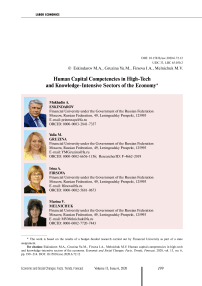Human capital competencies in high-tech and knowledge-intensive sectors of the economy
Автор: Eskindarov Mukhadin A., Gruzina Yulia M., Firsova Irina A., Melnichuk Marina V.
Журнал: Economic and Social Changes: Facts, Trends, Forecast @volnc-esc-en
Рубрика: Labor economics
Статья в выпуске: 6 т.13, 2020 года.
Бесплатный доступ
Modern society is a knowledge economy. A person who is able to assimilate, analyze, and transform information, received from outside, into knowledge comes to the fore. The requirements for professional and general cultural competencies of the leader’s personality are determined by his position in the system of two types of relations: formal ones, due to the power vertical of responsible dependence, and informal ones, related to interpersonal likes and dislikes and intergroup relations in the performance of direct official and public functions. Within the framework of assessing the personal qualities of a leader in high-tech and knowledge-intensive sectors of the economy, there are criteria for indicators and development levels of his/her competence. A successful leader in high-tech and knowledge-intensive sectors of the economy should not only have value-based ideas about the organization of labor and have high professional competencies but also be able to effectively and lawfully manage human capital and know the mechanisms of the labor economy. Knowledge becomes the leading production segment, commodity exchange. In the leading countries, from 75 to 90% of the gross domestic product is created at the expense of scientific and technological progress, research and development work. The mechanism of knowledge production has been launched, which is a combination of fundamental science, universities, business schools, knowledge transfer, information flows, etc. In this regard, a leader of an organization and staff should have formed competencies for working in conditions of quantitative data overload, irrelevant and blurry information, information and emotional overload. Effective management style of a leader involves the formation of competencies for localization of information pressure, which is aimed at developing information culture in the organization. Our purpose is to determine the dominant characteristics of the qualities of a leader - a manager, working in the field of high-tech and knowledge-intensive industries, to develop a model of the formation and development of competences of a leader in the field of human capital management in the process of his professional activity, as well as the model of the leadership institute development. The authors adhere to the basic idea of the need to analyze abilities, knowledge, and skills, acquired and formed at an university, and to assess general professional and personal qualities of graduates that are required by employers. The main applied methods include desk and sociological research based on systematic and integrative approaches.
Human capital, leadership, high-tech and knowledge-intensive sector of the economy, leadership competencies, human capital management
Короткий адрес: https://sciup.org/147225504
IDR: 147225504 | УДК: 33 | DOI: 10.15838/esc.2020.6.72.12
Текст научной статьи Human capital competencies in high-tech and knowledge-intensive sectors of the economy
Modern society is characterized, first of all, by a key development of high technologies. Its distinguishing feature is a high level of expenditures on research, developments, and human capital advancement. In this regard, organizations and the labor market place high demands on human capital [1–5], specifically: a high level of technical knowledge, skills, and competencies for the implementation of business processes and innovation activities; a high level of business training for the implementation of innovative projects;
creativity and professional skills for producing innovative goods and technologies; an ability to work in a team; technical knowledge and skills as the main element of innovation development at an enterprise to increase its competitiveness; innovative activity as a key quality of innovation development; an ability to make quick nonstandard decisions.
A starting point of effective management of an organization in high-tech and knowledgeintensive sectors of the economy, according to HR services, is the determination and functioning of a new type of leaders – ones with digital competencies and team-oriented skills [6–10]. 48% of companies-leaders in this sphere note that investments in human capital have been a key element of the income growth over the last two reporting periods. For example, in IT technologies, the website of the international consulting company IDC contains a six-step structure that makes it possible to determine the development level of digital leadership of organizations in high-tech sectors of the economy. The criteria for drawing a conclusion separately assess activities of IT and project officers (CDO – Chief Digital Officer). Market development forces leaders to find new ways of attracting new digital talents – digital developers, database researchers, UX (User Experience) and UI (User Interface) experts, as well as design consultants [11]. These personnel will help an organization to quickly and effectively turn the usage of digital data into digital opportunities for bringing profit. This is confirmed by SAP (System Analysis and Program Development) research: currently, leading companies are much more likely to create previously nonexistent vacancies that are necessary for taking a leading position in a competitive market. Deloitte has developed a digital maturity model that provides a unique opportunity to determine the level of leadership development in organizations.
The formation of new technological structures (fifth and sixth) acts as a springboard in emergence and development of new specialties. Global trends in the knowledgeintensive product market are presented in table 1 .
Organizations adapt to changes in the labor market and the economy, which entails the need to form new competencies, modern qualifications that meet the requirements of environment and, consequently, human capital development [12; 13]. In modern Russia, the most competitive areas of export of high-tech goods are non-electronic machines, equipment for electric and nuclear power plants.
Thus, the article explores approaches to the assessment of the development of a leader’s key competences and suggests recommendations for their formation in the sphere of managing human capital in high-tech and knowledge-intensive economic sectors (telecommunications, automotive manufacturing, medicine, computer equipment production, business manufacturing, pharmacology, chemical, aerospace, and defense industries). The qualities of a leader are characterized on the basis of a manager’s roles matrix. We propose the author’s scheme for the formation of managerial competencies of a
Table 1. Global trends in the knowledge-intensive product market
Theoretical materials and methods
The priorities of social development in the modern knowledge-intensive economy, which is based on knowledge and the carrier of this knowledge – human capital, require a new vision regarding the formation of competencies among leaders who are capable of transformation, setting a change direction, and becoming catalysts and conductors of transformational processes [14–16]. In this regard, it is necessary to note the importance of approaches and methods in the development of human capital:
– systematic approach: human capital development is associated with its improvement in the professional sphere, i.e. labor. Any activity (mental or physical) depends on the thought processes that lead a person to certain actions. In the process of thinking, a person relates practical experience to acquired knowledge and competencies he/she owns and develops, which allows deeper penetration into the essence of an activity. This is the meaning of the systematic approach as the highest level of algorithmization activity in the development of understanding the world and incrementing knowledge;
– motivational approach to human capital development allows us revealing the creative potential that can cope with the challenges of the modern world, the value of which is determined by the critical thinking skills, the availability of applied knowledge and competencies that are in demand in a rapidly changing economy. Since the social side dominates in the structure of a personality (worldview, needs, interests, ideals, moral qualities, etc.), the main goal of human capital development is a free development of an individual;
– integrative approach forms a holistic picture in human capital development (the integration core) and contributes to the consideration of the development process;
– synergetic approach is considered in the context of organizational changes to achieve a qualitatively new synergetic model of human capital. In this context, the use of a synergistic approach allows understanding what needs to be changed and how;
– competence approach: the importance of key competencies cannot be disputed, as they are necessary for any professional activity, as they are associated with self-improvement of an individual in a rapidly changing economy. Possession of key competencies allows solving any professional problems;
– information and digital approaches, the essence of which in the field of development of polyvalence of human capital knowledge is determined at the level of an object, functional orientation of its goals, which consist in the multidimensional dynamic development of the spatial educational component of information knowledge.
Thus, a successful formation of necessary competencies depends on how their composition, structure, and determination will be defined from the point of view of practical application, functioning, and development [17]. Currently, several principal areas are being considered:
– possible paradigm changes in the application of digital technologies;
– interiorization of skills to improve digital activities;
– analysis of multidimensional processes associated with the acquisition of experience in mass education digitalization.
Figure 1. General structure of the competence model
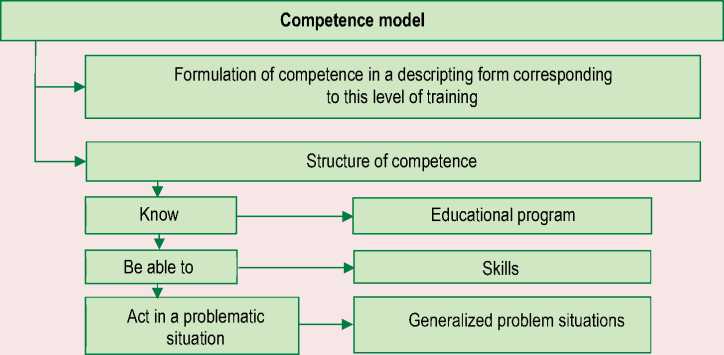
Source: own compilation.
Let us review the competence model’s general structure (Fig. 1).
A high competence of a leader, which is manifested in his conceptual and positional form of personnel management, is based on optimal ways of organizing joint activities, purposeful usage of various psychological and managerial factors that increase group and individual production efficiency, ability to use a right type of interaction and avoid socio-cognitive personal conflicts. Given this understanding of functions, activities of a leader in high-tech and research-intensive industries within digitization can be reflected in the following qualities from a psychological point of view ( Tab. 2 ).
A leader in institutions and industries, related to high-tech and knowledge-intensive economic sectors, is an object of active communication who performs an important communicative function. He/she organizes professional actions through a system of various social connections in the form of direct communication between participants of internal and external social networks through planning, analysis, and reflection of their own actions, actions of partners, their mutual adequacy, and adequacy of possible joint actions for achieving the goal. Thus, links between personal and collective interests are strengthened, and, therefore, we can talk about the synthesis, as well as a possibility of a qualitative transformation of a leadership’s desire for self-affirmation, which ultimately should take self-realization form in achieving collective goals and solving group strategic tasks.
Additionally, it is necessary to identify criteria, indicators, and levels of development of a leader’s competence.
We believe that top-level leaders should be further evaluated by such criteria as:
– delegation of rights and obligations;
– strategic thinking;
– ability to provide a feedback;
– complexity and responsibility of management tasks performed;
– high level of professional competences;
– striving for the development of an organization’s human capital;
– ability to work in accordance with the declared values.
Table 2. Characteristics of a leader’s personality traits in high-tech and knowledge-intensive economic sectors
|
Qualities |
Characteristics |
|
Systematic skills: professional and intellectual in the field of process management |
Creative use of the program-role concept of a scientific and production team, the use of theoretical educational base, professional intelligence and logical thinking to build a multi-level structure of group processes, the introduction of applied scientific concepts that have an innovative nature and are necessary to achieve high production results, strategic thinking, a high level of professional competencies. |
|
System-forming skills: situational-communicative and organizational |
The application of the concept of personality development in socially useful activities in technologyintensive industries, the presence of responsibility and creativity, based on the principle of active mediation in the solution of practical problems, high communicative and personal potential, promotion of high standards of planning and controlling activities of managers and subordinates a sense of responsibility for the expected results, the ability to create internal and external networks of influence |
|
Individual psychological: emotional and volitional |
The use of the concept of integral individuality in the determination of personality type in a collectiveform industrial and scientific activity, the availability of self-motivation to personal development and establishing high standards for themselves and subordinates, high level of determination and extraordinary will power, informative motivation research-production team to achieve a goal, focus on the formation of intellectual-intensive human capital of an organization, the ability to manage their own emotions, stress and conflict resistance, empathy, resistance |
|
Individual-positional: spiritual and moral |
Personal involvement in the scientific or industrial process, high morality from the point of view of the collective and society, active citizenship, formed ethical culture, the presence of moral values |
Source: own compilation on the basis of a manager’s role matrix (I. Adizes). Available at:
Based on this list, we can say that a primary criterion for evaluating a leader in high-tech and knowledge-intensive sectors of the economy is the level of manifestation of intellectual potential, managerial competencies, and leadership qualities.
Below, there is a model of the formation and development of a leader’s competencies in the course of his/her professional activity. Its development should be carried out in several stages (Fig. 2).
At the first stage, it is necessary to develop a leadership strategy for all levels of an organization’s management. It should be selected for one year and then adjusted in accordance with long-term plans and strategic goals of an organization. At the same time, the following recommendations for the implementation of a leadership strategy are proposed (Tab. 3).
At the second stage, the leadership management process should be developed. The organization of effective leadership in high-tech and knowledge-intensive economic sectors requires information management support. First of all, it is necessary to accumulate
Table 3. Measures to implement the leadership strategy
|
Content of an activity |
Products of activity |
Expected results |
|
Creation of a system of organizational and managerial leadership |
Programs for the effective use of intellectual potential; assessment of the value of intellectual property and goodwill |
Development of forms and methods based on the widespread use of IT technologies, development of network virtual structures, technologies; outsourcing of routine operations |
|
Formation of information culture in an organization |
Leadership indicator system, modern management business processes based on complex virtualized IT-infrastructures |
Formation of work schedules and modes for employees with leadership competencies in high-tech and knowledge-intensive sectors of the economy |
|
Formation of a system of motivation and stimulation of personnel |
Structure of competences |
Formation of information and intellectual culture for the development of leadership qualities of personnel, etc. |
|
Source: own compilation. |
||
Figure 2. Model of formation and development of competencies of a human capital leader in professional activity
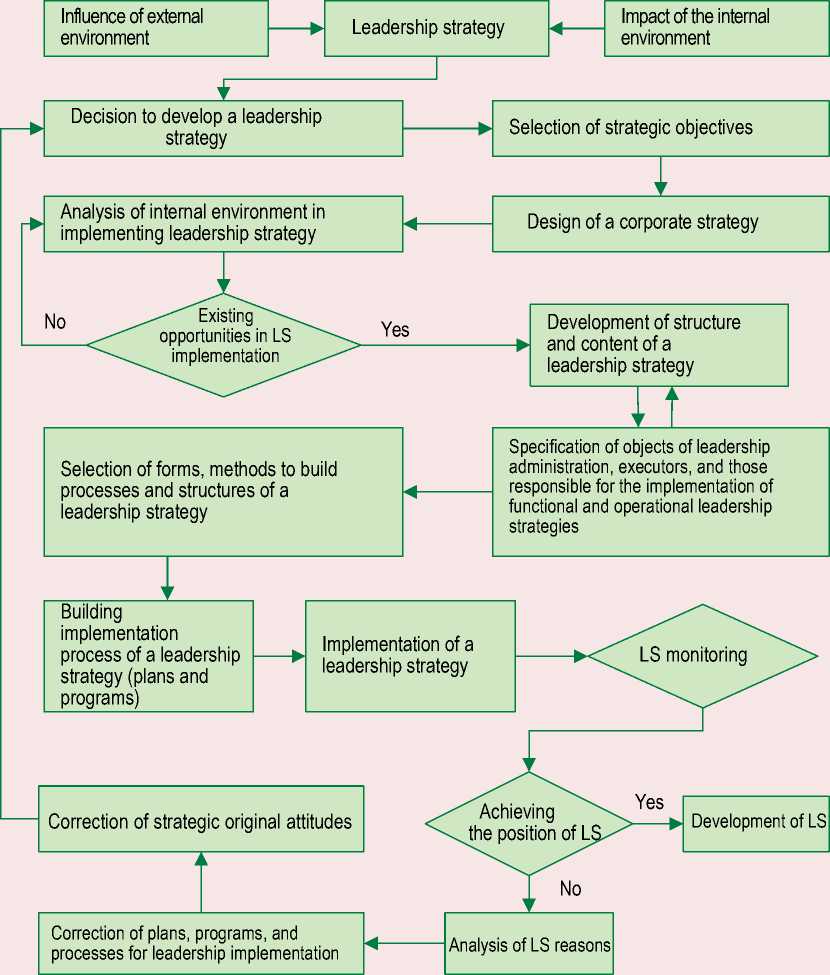
Source: own compilation.
information converted into an information system according to a single template (Fig. 3).
According to the model, a leadership development in an organization, reflected in the results of personnel’s incremental competencies, can become the “leadership institute”, the intellectual capacity of which is used for developing an organization and gaining leadership positions – on the world stage included. At the third stage, it is necessary to select and develop an effective system for
Figure 3. The process of developing the Institute of leadership in an organization
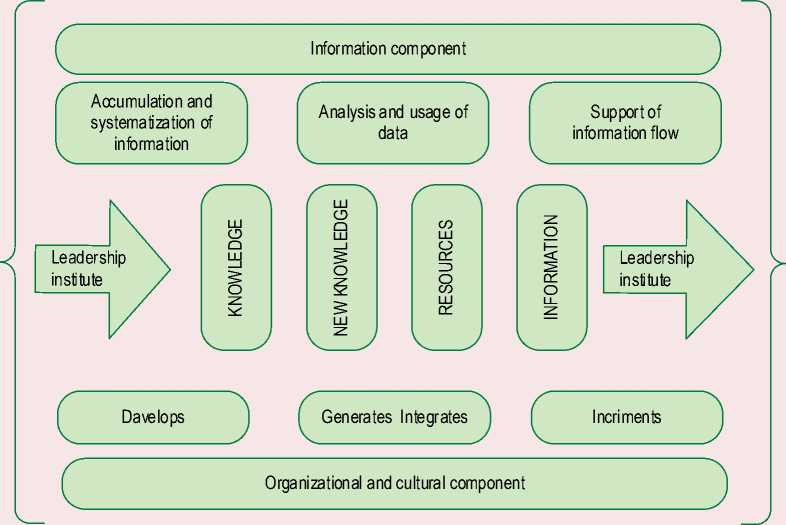
Source: own compilation.
evaluating the leadership competencies of employees, which can be implemented by an organization’s center for evaluating employees’ professional competencies.
The process of implementing leadership positions is based on the interest of external and internal parties, partners, consumers, staff, government, and public structures, but there are also disinterested parties – competitors in most cases. Consider the model of the process of achieving leadership positions ( Fig. 4 ).
Let us review an algorithm for evaluating an organization’s leadership strategy in high-tech and knowledge-intensive sectors of the economy. To do this, it is necessary to define criteria that will reflect a degree of achievement of the mission and strategic goals set. Criteria and indicators are related, first, to the analysis of dynamics in achieving and maintaining leadership positions in general and in certain areas of an organization’s activities; second, to the statics and dynamics in relation to competitors; third, to the achievement of strategic goals and objectives.
Leadership indicators are indicators designed to assess individual aspects of leadership in achieving stated positions [18].
The structure of the leadership assessment methodology is shown in figure 5 .
As a comparison with the requirements for a leader’s competencies in high-tech and knowledge-intensive sectors of the economy, we should consider the number of key competencies of a top manager in a particular industry. These include an ability to work with the goals and values of a company, the ability to effectively communicate externally and internally, an ability to accurately select key employees and use their best strengths in business [19].
Figure 4. Model of the process of achieving leadership positions
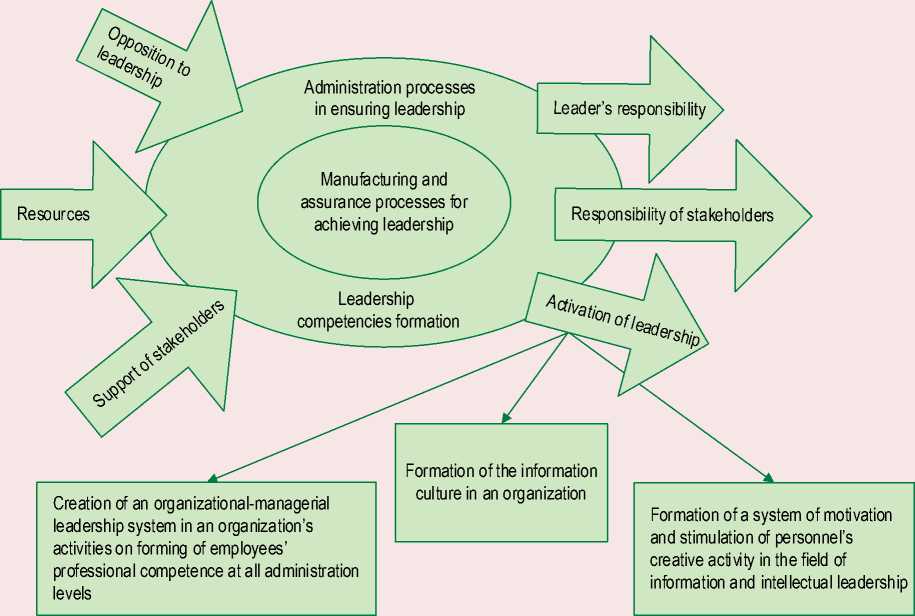
Source: own compilation.
Figure 5. Structure of the leadership assessment methodology
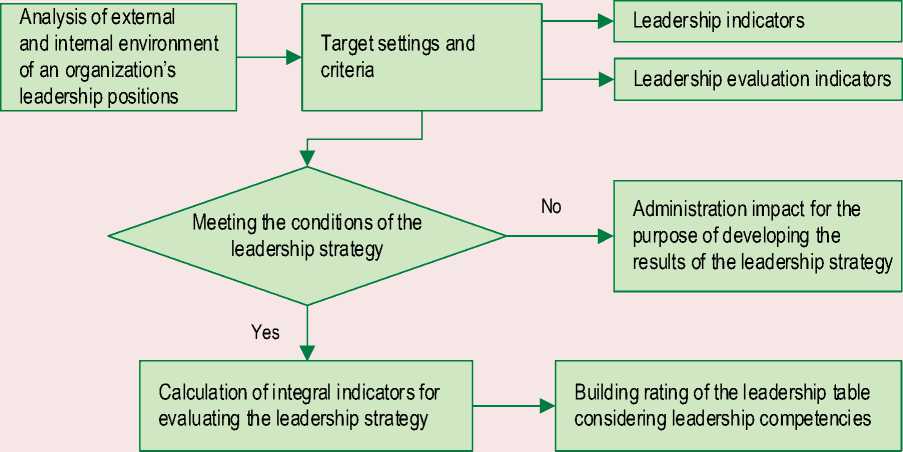
Source: own compilation.
Implementation of a comprehensive assessment of leaders in high-tech and knowledge-intensive sectors of the economy will solve the following tasks:
– formation of competencies in the field of management, also through training and receiving feedback from experts;
– creation of a communication platform for the exchange of experience between specialists in this field;
– promotion of the further development and dissemination of best management practices.
Assessment of general professional competencies and personal qualities
The modern economy requires higher education to form a new format of human capital, which has an ability and competence, so the structure of human capital activity in modern society, depending on which the education process should be built, changes [20]. It is very important to understand that the formation of leadership competencies in the students’ training is a significant stage in the further development of competencies in the professional sphere.
On the basis of statistical data of studies, conducted by the Industrial Development Fund1, the Agency for Strategic Initiatives2, a report of “RESMARK” company on conducting the marketing research “Survey of employers of graduates”3, and other sources4 [21], in which the purpose was to identify the level of the competence formation in training future leaders in the field of digital leadership in technology-intensive industries making appropriate adjustments in the education process, we analyzed the indicators of the assessment of a graduate’s competencies by an employer (Fig. 6–8).
Assessment of general professional competencies and personal qualities (n = 162).
Question wording for a respondent: evaluate the main general professional and personal – important for a specialist – competencies on a five-point scale to understand the extent of these skills among tested graduates. Rate it from 1 to 5 (or 0).
In general, employers’ assessment of competencies and personal qualities of graduates was 4.5 points on a five-point scale. The lowest score (3.7) concerns public speaking skills. This indicates that students are not ready or able to fully present their projects, research results, or themselves.
Within the framework of the bachelor’s degree in certain areas (management, state and municipal administration (SMA), economics, information technology (IT), business informatics (BI), statistics, applied informatics (AI), mechatronics and robotics (MiR), law), data on the assessment of general professional competencies and personal qualities are presented (see Fig. 7 ).
Certain skills of graduates – creativity (16%), communication (27%), and stress resistance (29%) – are not sufficiently developed. A higher assessment was given to the formation of competencies like an ability to work in a team (36%), initiative (37%), adaptability (38%), and focus on quality (38%). The highest indicator of demand and assessment of professional competencies is in the following areas: working capacity (39%), readiness for development (40%), focus on
Figure 6. Assessment of general professional competencies and personal qualities of a graduate by an employer, 2019
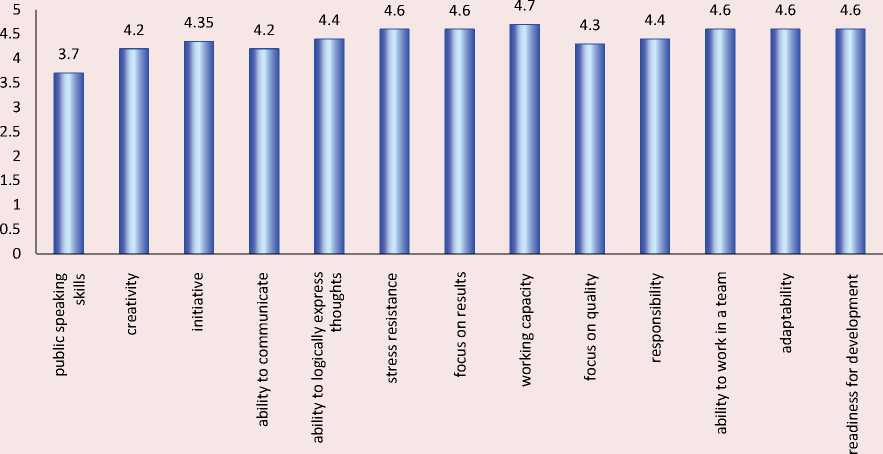
Source: a report of “RESMARK” company on conducting the marketing research “Survey of employers of graduates”. Available at: RESMARK_OTCH_%D0%9A%D1%80%D0%B0%D1%82 (accessed: May 1, 2020).
Figure 7. An employer’s assessment of general professional competencies and personal qualities of a graduate in areas of bachelor’s degree, 2019, %

II Management IISMA II IT IILaw II BI 11 AI IIMiR II Statistics II Economics results (41%), and ability to clearly express their thoughts (42%). Figure 8 shows the assessment of professional competencies.
Based on data in figures 6–8, it is possible to identify the strengths and weaknesses of graduates based on the results of a survey of employers in each bachelor area. In general, considering common professional competencies (see Fig. 6 ), it is necessary to note an average level from 3.5 to 4 points (the highest score is 5). However, indicators in certain areas revealed problem zones (see Fig. 7 ): rather low indicators of creativity, communication skills, public introduction and presentation of information, stress resistance. The assessment of professional skills is also a reason for reflection. The level of knowledge of information technologies, skills in the structure of cloud technologies and software is insufficient among graduates of nonspecialized and profile specialities (see Fig. 8 ).
The study showed that, currently, the labor market and the market of educational services weakly interact with each other. Although, there are attempts to build interaction on the basis of cooperation. Employers are interested in high-quality specialists, and they are ready to cooperate on mutually beneficial terms.
Discussion
On the basis of the analysis, we systematize the key competencies for the knowledgeintensive economy. Figure 9 shows the levels of professional and supra-professional competencies in the context of the development of the fifth and sixth technological modes.
As shown in figure 9, priority is given to the technical direction and breadth of the views. The human capital of an organization, on the one hand, is its resource; on the other hand – its human wealth.
Figure 8. An employer’s assessment of graduates’ professional qualities in bachelor areas, 2019, %
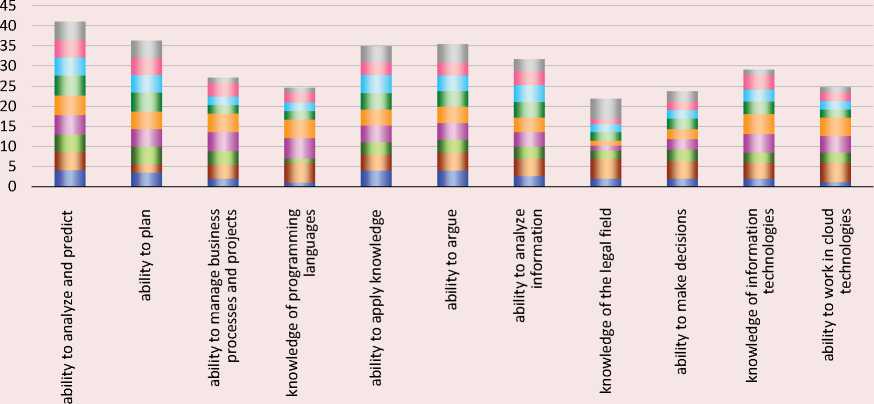
I II SMA II AI II Management II IT BI 11 Economics Statistics MiR Law
Source: a report of “RESMARK” company on conducting the marketing research “Survey of employers of graduates”. Available at: RESMARK_OTCH_%D0%9A%D1%80%D0%B0%D1%82 (accessed: May 1, 2020).
Figure 9. Structure of the main professional and supra-professional competencies within the fifth and sixth technological structures
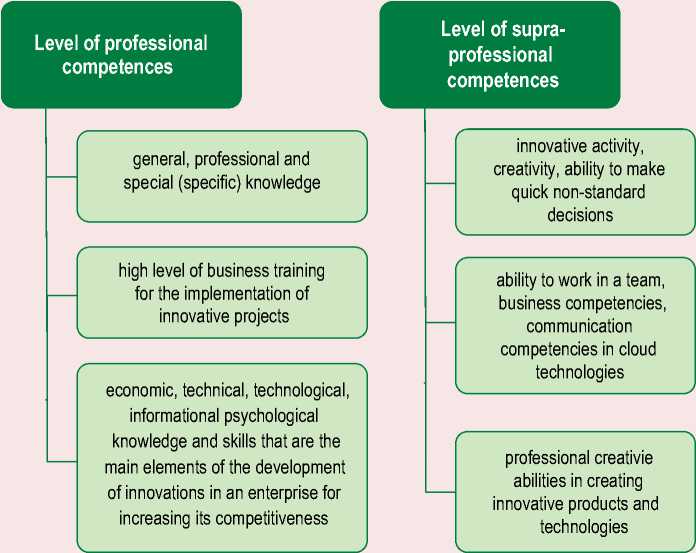
Source: own compilation.
Based on the analysis of competencies, required in the modern economy, five main types of competencies that are in demand in human capital development were identified: basic, information, digital, entrepreneurial, and personal.
Leadership is won in any type of activity and in all processes: production, management, provisionary, marketing, etc.; therefore, to assess the leadership of an organization, indicators and parameters are necessary to justify the process of achieving leadership and further manage it. As part of the discussion, it is necessary to consider such concepts as sustainability and flexibility of developing competencies. Flexibility will be a key property that should be achieved in the formation of the competence model. The following activities should be promising directions for further activities in this area: assessment of Russian organizations in high-tech and knowledgeintensive sectors of the economy, their ranking, and development of support measures. As a result, you need to create assessment centers of competencies in technology-intensive industries on the basis of universities in each region and develop a strategy for the implementation of innovative technologies in organizations. This clearly emphasizes a high coefficient of commercial potential of the conducted research.
Conclusion
The concept of creating high-tech industries forms the competitiveness and growth prospects of national economies, which are based on modern high-tech technologies and products with high costs of intellectual labor for their production. The demand in the modern market of high-tech and knowledge-intensive technologies is focused on highly qualified specialists who are able to independently make effective management decisions and have a set of certain knowledge and competencies that contribute to the development of the company’s activities [22; 23]. It is a trained human capital, which owns modern training technologies and can quickly solve tasks, may develop breakthrough technologies.
We obtained the following results:
-
1. We defined systematic, strategic, communicative, organizational, psychological, and individual-positional qualities of a leader in high-tech and knowledge-intensive industries and characterized them using the matrix of a manager’s roles. We highlighted criteria and levels of development of a leader’s competence.
-
2. We presented the model of the formation and development of competencies of a leader in the field of human capital management in the course of his/her professional activity, which allows an organization to develop options for a leadership strategy, and proposed measures for their implementation. The author’s vision, regarding the development of the leadership institute in an organization and, as a result, the model of achieving leadership positions, is given.
-
3. Based on data of statistical studies, the authors analyzed the indicators of employers’
assessment of the competencies of bachelor graduates of modern universities and identified “painful” points of the formation of professional and personal qualities of future specialists in high-tech and knowledge-intensive economic sectors. It is concluded that there is a need for closer interaction between the labor market and the market of educational services.
Research shows that acquisition of knowledge and skills through the education system will help people improve their cognitive abilities and become more productive. People with more intellectual capital will be able to use their potential more effectively, and they will be more productive at work. There is a need for a breakthrough approach and a change in the structure of interaction between educational organizations and professional communities, a more flexible response of all departments when agreeing on necessary documents for the implementation of educational processes.
Many economists confirm the fact that investments in the development of human capital can affect the future real income of the state due to the formation of necessary knowledge and skills of society’s individual members. Research shows that, like financial capital, human capital is an intellectual national resource, and it creates a cumulative effect that will be producing a positive result over a long period of time.
Список литературы Human capital competencies in high-tech and knowledge-intensive sectors of the economy
- Aktual’nye problemy psikhologicheskogo obespecheniya prakticheskoi deyatel’nosti silovykh struktur: Sbornik materialov Tret’ei Vserossiiskoi nauchno-prakticheskoi konferentsii spetsialistov vedomstvennykh psikhologicheskikh i kadrovykh sluzhb s mezhdunarodnym uchastiem [Urgent problems of psychological support for the practical activities of law enforcement agencies: Proceedings of the Third All-Russian research-to-practice conferencewith international participation for specialists of departmental psychological and personnel services]. St. Petersburg: Sankt-Peterburgskii imeni V.B. Bobkova filial RTA, 2014. 462 p.
- Deci E.L., Ryan R.M. Motivation, Personality, and Development within Embedded Social Contexts: An Overview of Self-Determination Theory: The Oxford Handbook of Human Motivation. 2012. DOI: 10.1093/oxfordhb/9780195399820.013.0006
- Nie Y., Chua B.L., Yeung A.S., Ryan R.M., Chan W.Y. The importance of autonomy support and the mediating role of work motivation for well-being. Testing self-determination theory in a Chinese work organisation. International Journal of Psychology, 2014, no. 50. DOI: 10.1002/ijop.12110
- Kapelyushnikov R.I. Ekonomicheskie ocherki: Metodologiya, instituty, chelovecheskii capital [Economic Essays: Methodology, Institutions, Human Capital]. Moscow: HSE Publishing, 2016. 576 p.
- Charan R., Barton D., Carey D. Talant pobezhdaet: O novom podkhode v realizatsii HR-potentsiala [Talent Wins: The New Playbook for Putting People First]. Translated from English. Moscow: Olimp-Biznes, 2019. 224 p.
- Goldstein J., Hazy J.K., Lichtenstein B.B. Complexity and the Nexus of Leadership. Leveraging Nonlinear Science to Create Ecologies of Innovation. Palgrave Macmillan, 2010. 213 p.
- Brennan J., King R., Lebeau Y. The Role of Universities in the Transformation of Societies. The Open University Report. Available at: https://pdfs.semanticscholar.org/e42f/ab64590cb909b311269.pdf
- Hazy J.K., Goldstein J.A., Lichtenstein B.B. Complex Systems Leadership Theory: New Perspectives from Complexity Science on Social and Organizational Effectiveness. In: Exploring Organizational Complexity Series. V. 1. Mansfield, MA: ISCE Publishing, 2007. 496 p.
- Schyns B., Kiefer T., Kerschreiter R., Tymon A. Teaching implicit leadership theories to develop leaders and leadership: How and why it can make a difference. Academy of Management Learning Education, 2011, vol. 10, no. 3, pp. 397–408.
- Faskhiev Kh.A. Intellectual capital as a factor of innovative activity. Menedzhment v Rossii i za rubezhom=Management in Russia and Abroad, 2020, no. 1, pp. 17–28 (in Russian).
- Gruzina Yu.M., Volkova E.S., Varnavskii A.V. et al. Assessing digital maturity of organizations in the leading scientific and technical sectors and fundamental researches. Samoupravlenie=Samoupravlenie, 2019, vol. 2, no. 4 (117), pp. 77–79 (in Russian).
- Pluzhnikova A.A., Sedova T.V. Human capital in higher education. NovaInfo.Ru=NovaInfo.Ru, 2018, vol. 1, no. 77, pp. 202–205 (in Russian).
- Manerov G.N., Denisenko E.A. Investments in human capital – the basis for the development of modern economy. Innovatsionnye tekhnologii v mashinostroenii, obrazovanii i ekonomike=Innovative Technologies in Engineering, Education and Economics, 2018, vol. 13, no. 1-1 (7), pp. 11–14 (in Russian).
- Crevani L., Ekman M., Lindgren M., Packendorff J. Leadership cultures and discursive hybridization: On the cultural production of leadership in higher education reforms. International Journal of Public Leadership, 2015, no. 11(3–4). DOI: 10.1108/IJPL08–2015–0019 24
- O’Reilly D., Reed M. ‘Leaderism’: An evolution of managerialism in UK public service reform. Public Administration, 2010, no. 88(4). DOI: 10.1111/j.1467–9299.2010.01864.x
- Péladeau P., Herzog M., Acker O. The new class of digital leaders. Tech & Innovation, 2017, no. 88. Available at: https://www.strategy-business.com/article/The-New-Class-of-Digital-Leaders?gko=a250f (accessed: 14.09.2020).
- Konchakova L.N., Chugunova S.V. Human capital and investments in human capital of the enterprise. Aktual’nye problemy aviatsii i kosmonavtiki=Topical Issues of Aviation and Cosmonautics, 2017, vol. 3, no. 13, pp. 48–50 (in Russian).
- Serbinovskii B.Yu., Ozdoeva A.M. Strategiya intellektual’nogo liderstva universiteta novogo tipa na rynke obrazovatel’nykh i nauchnykh uslug [The Strategy of Intellectual Leadership of a New Type of University in the Market of Educational and Scientific Services]. South Federal University. Novocherkassk: YuRGTU (NPI), 2010. 204 p.
- Sergeeva M.G, Vizaulina V.V. Development of social interaction competence when training a modern specialist. Problemy sovremennogo pedagogicheskogo obrazovaniya: Sbornik nauchnykh trudov=Problems of Modern Pedagogical Education, 2019, no. 65, part 3, pp. 165–168 (in Russian).
- Lavrenyuk K.I., Mazelis L.S., Kryukov V.V. Optimizatsionnye modeli investirovaniya v chelovecheskii kapital kafedry universiteta [Optimization Models of Investing in Human Capital of the University Department]. Vladivostok, 2016. 161 p.
- Eskindarov M.A., Maslennikov V.V., Maslennikov O.V. Risks and chances of the digital economy in Russia. Finansy: teoriya i praktika=Finance: Theory and Practice, 2019, vol. 23, no. 5(113), pp. 6–17 (in Russian).
- Goffee R., Jones G. Clever: Leading Your Smartest, Most Creative People. Boston, MA: Harvard Business Press, 2009.
- Black S.A. Qualities of effective leadership in higher education. Open Journal of Leadership, 2015, no.4. Available at: http://dx.doi.org/10.4236/ojl.2015.42006

